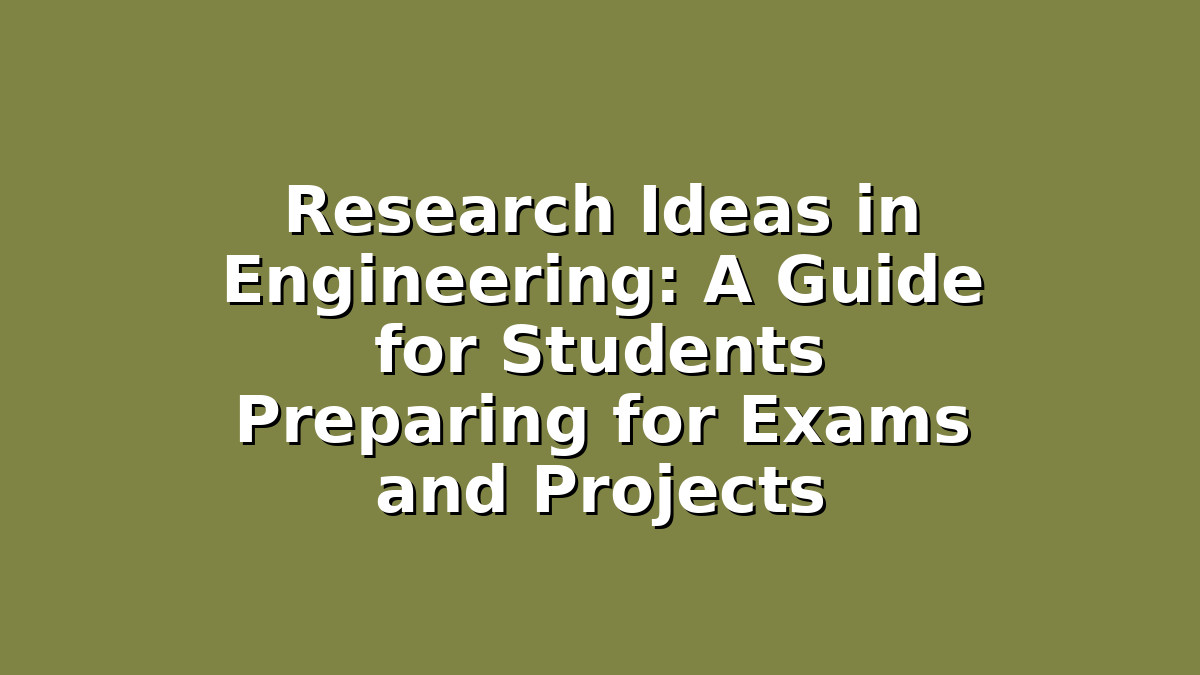Engineering is a fascinating and dynamic field that constantly evolves with new technologies and innovations. For students preparing for exams or looking to embark on research projects, choosing the right research ideas can be both exciting and challenging. Whether your goal is to improve your understanding, enhance your problem-solving skills, or develop innovative solutions, exploring relevant research topics can make a significant difference in your academic journey.
In this article, we will discuss various research ideas in engineering tailored for students, along with practical study tips to help you prepare effectively for your exams and research projects. Our aim is to encourage and empower you to dive deeper into your field, develop critical thinking, and excel in your studies.
1. Exploring Sustainable and Renewable Energy Engineering Research Ideas
Sustainability is at the heart of modern engineering. With the global emphasis on reducing carbon footprints and combating climate change, research in renewable energy sources and sustainable engineering practices offers promising opportunities for students. Here are some study-related tips to approach these research topics effectively:
– Focus on emerging technologies: Investigate solar panels, wind turbines, bioenergy, or energy storage systems. For example, research on improving the efficiency of photovoltaic cells or designing smart grids can provide meaningful contributions.
– Integrate multidisciplinary knowledge: Renewable energy research often involves electrical, mechanical, and environmental engineering principles. Strengthen your fundamentals in these areas through targeted study sessions.
– Apply real-world case studies: Analyzing existing sustainable energy projects will deepen your understanding and help you connect theory with practical applications.
– Study tip: Use concept mapping to organize key ideas about energy conversion processes, material properties, and environmental impacts. This technique enhances retention and helps you see connections across topics.
By focusing on sustainability, you not only align your research with global priorities but also develop skills that are highly sought after in the engineering job market.
2. Diving into Robotics and Automation Research Ideas
Robotics and automation have revolutionized industries ranging from manufacturing to healthcare. For engineering students, this is a fertile ground for research that blends hardware design, programming, and artificial intelligence. Consider these approaches to make the most of your studies and research explorations in this area:
– Choose a specific application: Robotics covers many domains such as medical robots, industrial automation, drone technology, and autonomous vehicles. Narrowing your focus helps deepen your expertise.
– Master foundational concepts: Brush up on control systems, sensors and actuators, embedded systems, and programming languages like Python or C++. Regular practice with coding exercises and circuit design will reinforce your skills.
– Engage with hands-on projects: Building or simulating robots can enhance your understanding of theoretical concepts and improve problem-solving abilities.
– Study tip: Create a study schedule that balances theory and practice. For example, dedicate mornings to learning algorithms and afternoons to hardware assembly or coding tasks. This variety keeps your learning engaging and efficient.
Research in robotics not only sharpens your technical skills but also nurtures creativity and innovation, preparing you for diverse engineering challenges.
3. Investigating Smart Infrastructure and Civil Engineering Innovations
Civil engineering is evolving rapidly with the integration of smart technologies that improve infrastructure resilience, safety, and efficiency. Students interested in this field can explore research topics involving smart materials, structural health monitoring, and sustainable urban development. Here are some study strategies to excel in this area:
– Explore smart materials: Research materials that adapt to environmental conditions, such as self-healing concrete or shape-memory alloys. Understanding their properties and applications can open new research possibilities.
– Study sensor technology and data analysis: Structural health monitoring relies heavily on sensors and IoT (Internet of Things) systems. Strengthening your knowledge of sensor networks and data analytics is essential.
– Connect theory with simulation tools: Use civil engineering software like AutoCAD, SAP2000, or ANSYS to model and analyze structures. Simulations complement theoretical study and prepare you for practical tasks.
– Study tip: Join study groups or online forums focusing on civil engineering innovations. Discussing ideas and solving problems collaboratively can improve comprehension and motivation.
Researching smart infrastructure prepares you to tackle real-world challenges related to urbanization, sustainability, and disaster mitigation, making your studies both relevant and impactful.
Conclusion
Choosing the right research ideas in engineering can invigorate your academic journey and enhance your preparation for exams and projects. Whether you’re passionate about sustainable energy, robotics and automation, or smart infrastructure, integrating focused study techniques and practical experiences will help you excel.
Remember to organize your study time, balance theory with hands-on activities, and seek support through peers and mentors. Your curiosity and dedication are your greatest assets—embrace them fully as you explore the exciting world of engineering research.
With the right research topics and effective study strategies, you’re well on your way to not only acing your exams but also contributing to the future of engineering innovation.

Responses